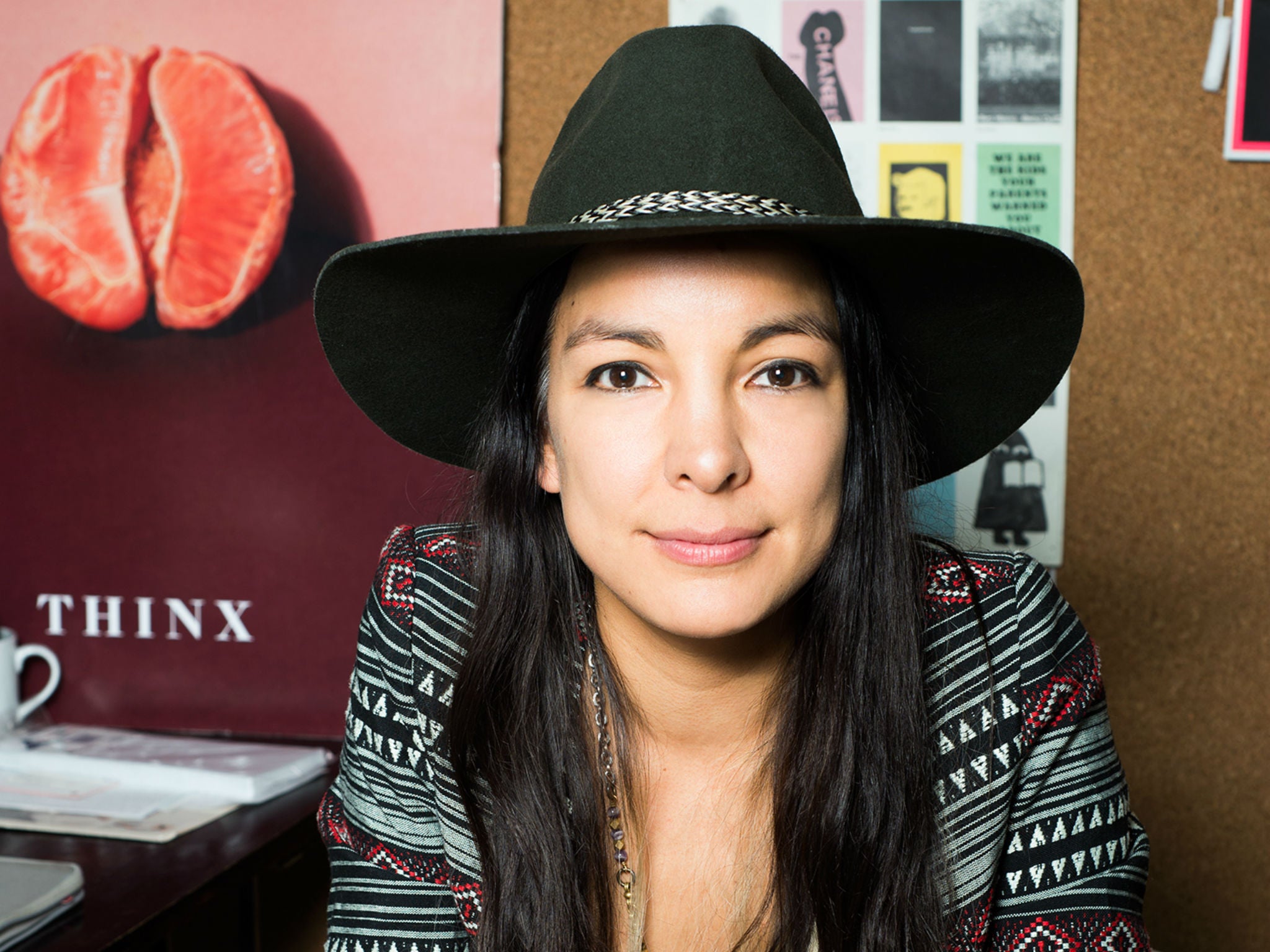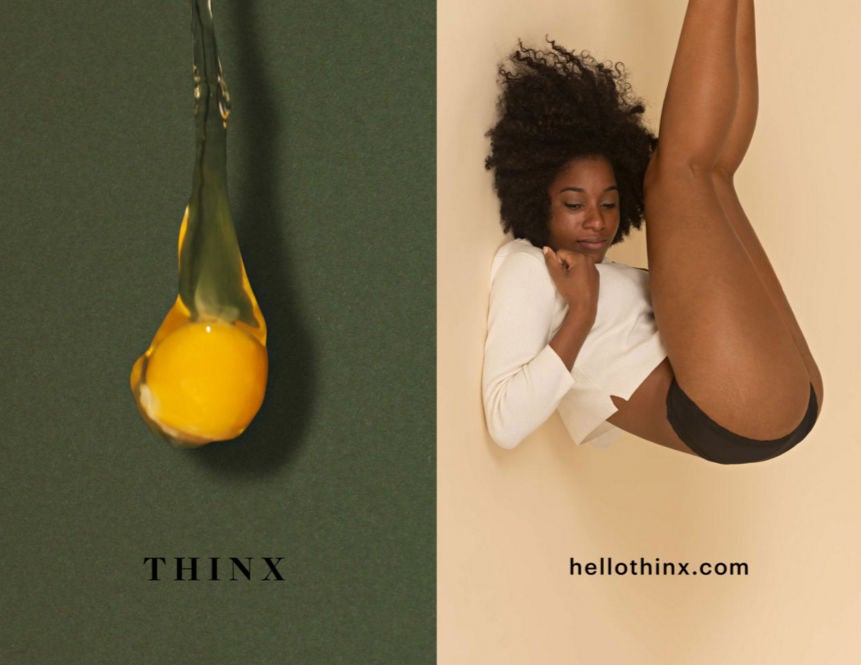THINX: Three women's battle to advertise their radical period-proof underwear on New York's billboards
The co-founder of THINX, one of TIME Magazine’s greatest inventions of 2015, tells The Independent why she is determined to break the taboo around women's periods

Your support helps us to tell the story
From reproductive rights to climate change to Big Tech, The Independent is on the ground when the story is developing. Whether it's investigating the financials of Elon Musk's pro-Trump PAC or producing our latest documentary, 'The A Word', which shines a light on the American women fighting for reproductive rights, we know how important it is to parse out the facts from the messaging.
At such a critical moment in US history, we need reporters on the ground. Your donation allows us to keep sending journalists to speak to both sides of the story.
The Independent is trusted by Americans across the entire political spectrum. And unlike many other quality news outlets, we choose not to lock Americans out of our reporting and analysis with paywalls. We believe quality journalism should be available to everyone, paid for by those who can afford it.
Your support makes all the difference.Did you know the word “period” is extremely difficult to get on an advert in New York City?
Miki Agrawal didn’t either. When the 37-year-old Canadian started out to create THINX, a company selling stylish period-proof underwear for women, she hadn’t anticipated the enormous backlash from boards of “white, middle-aged men” who would have problems with even mentioning women’s monthly flows.
But the Cornell University graduate and entrepreneur, alongside her twin sister Radha and Antonia Dunbar, continued to fight. Now their underwear company has been named one of the best inventions of 2015 by TIME magazine, revenue has grown 23 times since 2014 - after first raising over $130,000 from crowdfunding sites and competitions - and THINX now employs 30 people.
The first attempt to get their adverts out there in autumn last year, however, was arguably disastrous.
The proposed advert tagline: “Underwear for women with periods” was rejected. Outfront Media, the third party that manages ads for the subway's Metropolitan Transport Authority, demanded they change the wording.
The same agency, Ms Agrawal noted, allowed adverts for breast surgery, adverts for the Museum of Sex, and a man choking a woman in film “50 Shades of Grey”.
Ms Agrawal threatened to go to the press. The story went viral. A week later, the advertising agency was pressured to back down.
Now, the adverts feature on one out of every 10 subway carriages in New York City and are plastered all over Grand Central Station.
New Yorkers would not have failed to notice them. The ingenious and artistic pictures of a grapefruit - a vagina - and an egg - representing a woman’s menstrual cycle - were also initially shot down by Outfront Media, who claimed the items were “suggestive and offensive to riders”.
“They said the egg looked like male ejaculation,” said Ms Agrawal, shaking her head as she cradled a mug of Chai tea in her Williamsburg apartment. “And to think that the exact same fruit - a grapefruit - was used to depict a woman’s augmented breasts in adverts on the subway. How is that OK?”

There is no doubt that periods are becoming increasingly political. The Tampon Tax has enraged women across the US and the world. Petitions have raised the plight of homeless women trying to go through their periods with dignity. Schools are providing free tampons and pads in their nurses office so children don’t have to go home and rummage the cupboards.
But the fight is far from over. The Ms Agrawals were not allowed to get their products advertised on the NYC yellow taxi TVs, talk shows believe talking about periods is “crass” and the sisters still struggle to find modeling agencies who allow their models to feature in “period ads”.
We might take sanitary pads and tampons for granted in the developed world, but Ms Agrawal said countless women suffer one week of shame for every month of their menstruating lives. In India, women are banned from their kitchens and in Nepal, women are sent to sleep in the cowshed.
That is why the language of THINX adverts is all the more revolutionary, even in the US. They read more like you are texting a girlfriend than discussing a biological process.
“No, they’re not like diapers, and you don’t have to sit in ur blood all day. Boom," one advert reads.
Author of “Do Cool Sh*t” Miki Agrawal is totally tapped into her target market. She uses an app called Clue to monitor when she’s ovulating - “people try to put the fear of God in you [about getting pregnant]” - and she rarely stops to sit down during the interview, sorting vitamins into her daily capsules, tapping at her phone and getting ready for her day at her Chelsea-based office.
Her company also has an altruistic agenda - they send a portion of money from their sales to supply women in Uganda with reusable menstrual pads. Ms Agrawal said that as a result of THINX, 40,000 girls can stay at school during their periods.
Yet some media commentators have said it’s time to stop talking about periods. It’s been done already. It’s a bit gross, right?
Ms Agrawal responded that periods are still a “taboo” and that the conversation around menstruation has just started.
“Look at the Suffragette movement which gave women the right to vote - that was less than 100 years ago," she said. "We are now in the fourth wave of feminism when women are really starting to be independent and have their voices heard.”
The business has expanded into other areas, including an affordable and easy-to-install bidet called "Tushy Me" - “you don’t have to smear poo up your butt with paper anymore” - and pee-proof underwear for women, particularly post pregnancy - “One in three women will suffer from leakage at some point in their lives”.
Future plans from THINX promise to “disrupt the tampon market” and Ms Agrawal is about to embark on an 11-city tour alongside sportswear company Lulu Lemon to promote her range of underwear. The entrepreneur has not had a day off for almost two months.
As a serial entrepreneur, obstacles in business are not an alien concept to Ms Agrawal. She also owns two organic and gluten-free pizza restaurants in Williamsburg and in the West Village. Her sister is also the founder of Daybreaker, a movement of early morning dance parties without alcohol or drugs.
But periods were a new business concept, and very personal. She found she was dealing with blood leakages on a monthly basis as she dashed around from restaurant to restaurant. This inconvenience served as an inspiration to launch THINX.
Asked to give advice for other aspirational women entrepreneurs, she responded simply: “It’s easy to talk and say: “I wanna, I wanna”. Talk is cheap. It’s about taking positive action every day."
Join our commenting forum
Join thought-provoking conversations, follow other Independent readers and see their replies
Comments